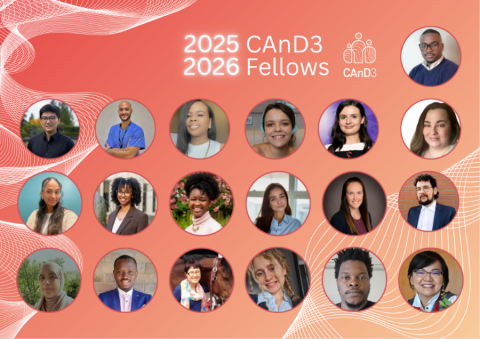Wednesday, September 7th will mark the start of the third year of the Population Analytics in an Aging Society Training Program. The 20 accomplished Fellows, selected to participate in the Consortium on Analytics for Data-Driven Decision-Making’s (CAnD3) 2022-23 training year, will convene virtually from 15 different institutions from across Canada and the United States.
The topic for the kick-off event on the seventh? ‘The Many Faces of Population Aging’, a theme that emphasizes the interdisciplinary and intersectoral exchange needed to address a momentous demographic shift. It is a poignant beginning to the year-long curriculum that will combine substantive knowledge and statistical training with population analytics.
Introducing the 2022-23 CAnD3 Fellows
Each year, the CAnD3 cohort is selected from its partner higher education institutions. The new cohort represents a diverse set of backgrounds, with five in Master’s programs, 12 in PhD programs, and three completing postdoctoral training. They bring a range of disciplinary training from political science and economics to public health and gerontology, researching topics such as the role of artificial intelligence in shaping gender and ethnic bias in the labour market, institutional responses to anti-racism activism, and social isolation among older adults.
The professional experiences of the 2022-23 Fellows are equally varied, including work in public administration, banking, public policy, and international development. Strengthened by the diversity of their experiences, skills, and interests, the 20 Fellows share the common goal of tackling the structural, policy, and institutional challenges that face aging societies.
Here are what some of the new Fellows have to say about the CAnD3 training program:
Lucy Kervin is a PhD Candidate at Simon Fraser University researching health and social care access disparities experienced by older Canadians. She says that the CAnD3 training program will help to achieve her goal of “working within a health governance agency… to mobilize population health research findings to data-driven practice and policy change.”
Alla Konnikov, a postdoctoral fellow at the University of Alberta, is interested in the nexus of immigrants’ skill transferability in professional markets and women’s careers in male-dominated fields. “I pursue a methodologically diverse research program that combines quantitative and qualitative methods,” explained Alla. “The [CAnD3] program’s agenda strongly overlaps with my research interests. I am eager to learn about the life-course oriented perspectives and hone my methodological skills.”
Exaucé Ngadande is pursuing a PhD at the University of Montreal, analyzing the marital trajectories of immigration from Sub-Saharan Africa in Canada, using machine learning. For him, the program is “an opportunity to learn more about new statistical analysis methods… that are better adapted to the exploration of mega-data that are increasingly available thanks to digital technology.”
You can learn more about our Fellows and their work on our website.
Looking forward
“As we launch the third year of our program, we are looking forward to bringing you more of CAnD3 and growing our community further,” said CAnD3 Director, Dr. Amélie Quesnel-Vallée.
Due to COVID-19, the past two years of the program were largely virtual, with the exception of the 2022 CAnD3 Keynote Address in June 2022. Dr. Amélie Quesnel-Vallée shared the happy news that “we will host our first CAnD3-wide in-person event in June 2023 in Montréal. We hope you will be able to join us and all our Fellows and alumni to celebrate their achievements.”
You can subscribe to our newsletter to receive updates about this upcoming convening and other events, Fellows, and opportunities from our partners.
About the training program
The Population Analytics in an Aging Society Training Program is a rigorous one-year fellowship hosted by the Consortium on Analytics for Data-Driven Decision-Making (CAnD3), funded by the Social Sciences and Humanities Research Council and based at McGill University. The program upskills rising researchers in Master's, PhD, and postdoctoral programs in the areas of population data science and computational population social science from a multidisciplinary lens. It also connects Fellows to experiential learning opportunities, which include hands-on research projects and internships with government, not-for-profit, and private sector CAnD3 partners. Since the first year of the program in 2020, CAnD3 has trained 32 Fellows and welcomes 20 new Fellows for the 2022-23 Academic Year.




